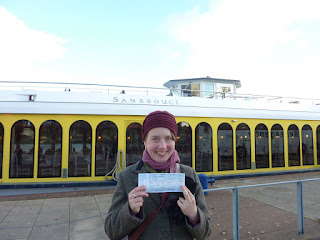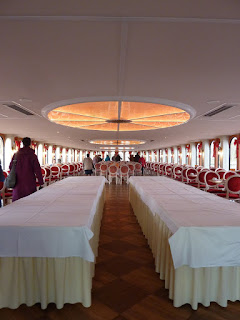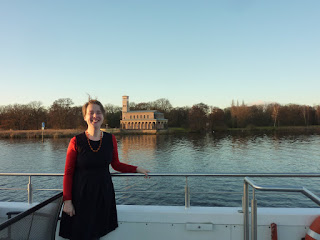 |
I've never liked the number
five. It's an odd number that looks as if it ought to be even. It is somehow complacent and bumbling, wholesome and healthy. It's the easiest,
least interesting interval to sing (it's even called the dominant, for goodness' sake, as if it weren't
self-important enough already); the place where you are, briefly, before you
get to the end, the tonic chord. It's half of ten and like all halves has a symmetrical quality while
also lacking something essential. Five is, I suddenly realise, a prime number,
so it ought to be interesting, but I still don't like it. It doesn't have the erratic, intriguing aspect of
seven, or the mystical connotations of nine, which is just the
opposite of five: it's not a prime number but looks as if it ought to be.
Poor number five. It can't help
itself, and all this is really just a roundabout way of saying that I did not
enjoy turning 45 a couple of weeks ago. I didn't enjoy turning 40, either, but
I grew reconciled to it, even started to enjoy it once I got to 41. But
45 is just....meh. As ages go, it has little to say for itself. There are plenty of role models, but there's no really desirable description. I'll have to invent one, perhaps. But I have to admit that despite my principles and my feminism, I'm a little intimidated. Looking at
myself in the mirror, I don't look young any more, but I don't look old either.
I scrutinise my laughter lines and my worry lines with the same doubts that
most women, married or single, mothers or not, gay or straight, have at this age. Am I attractive? Am I
interesting? Do I have anything to offer the world? What does it have to offer
me? Where will I be in five years? Will I ever live anywhere for more than a year at a time? Should I have another cup of tea? None of the answers are looking so great this
year, I think (except for the cup of tea). Maybe in a couple of years, when I finally get to a properly odd number, things will feel different.
Those were my general thoughts, a few weeks ago. But something in me rebelled against worry. Whether I was going to be 45 or 47, it was still my
birthday and I wasn't going to ignore it. I like my birthday, usually, and I decided that this year I wanted to do something special, something pretty, something slightly boring yet also - for me - exciting. Something I wouldn't be able to do in England. An Advent Boat Trip – Kaffee und Kuchen included – seemed the
perfect cosy solution for a late November birthday. Also, it had an element of 45-ness that I felt to be appropriate. "Enjoy the Havel in
all its wintry glory!" the brochure promised. I pictured myself drifting
through a beautiful snowy landscape in flickering candle-light while munching
on chocolate, and sent out excited invitations, with an alternative offer to
meet at a bar, just in case people didn't want to spend money on boat trips. It
turned out no-one except Mel and I wanted to go on a boat, and I wondered why.
Was it the money? Family commitments? Fear of getting seasick? Fear of - gasp! - leaving Berlin? "Oh,
well," I shrugged. "Their loss."
Like every year, my birthday this year fell exactly four weeks before Christmas. But this year, it also fell on a Sunday. While in England this would just mean I didn't have to go to work, this year we are in Germany. This year, Sunday 27th November had a meaning all of its own; it was der erste Advent, as they call it here ––
the first (Sunday in) Advent. And while this would be true wherever you were in the world, I had forgotten just what it means in Germany. Unlike in the UK, Christmas here doesn't start in September. Everything has a time and a place, and in the German calendar, der erste Advent has an important subtext: Christmas is nearly here, you numpties – get your act together and go
shopping now before it's too late! And suddenly, it was all happening. Christmas markets opened. Carol services
took off in a big way. Children ran around crafting lanterns frenetically – oh no,
sorry, that was 12th November, St Martin's Day. But it's not just lanterns - knitting, crocheting, pottery, badge-making, weaving, they all start to make unexpected appearances in the least handknitted of places. (Imagine Superdrug with basket-weaving.) And most importantly, crowds flock to
florist-and-candle shops, which I think may only exist here, to buy those German winter essentials: Advent wreaths and as many candles as you can fit in your bike basket.
The day before my birthday, on Saturday
morning, we joined everyone else at the market in Zehlendorf, where little tents were full of jolly
people selling local vegetables (huge baskets of glossy, exotic looking
cabbages, kale, brussels sprouts, parsnips and kohlrabis, and even Teltow turnips!),
local meat, bread, cheese and wine. The air was icy and tall Germans in their
woollen coats breathed clouds of steam, laughing and chattering at the onset of
proper winter and more importantly, Christmas. We took the plunge and
launched ourselves into the shop at the end of the street which sold Advent
wreaths, jostled and pushed by crowds buying pungent-smelling greenery and
silver Santas on a stick. Everywhere we went, people wished us "Froher Erster
Advent!" I hadn't realised it was quite such a festive occasion, and it was lovely. But then
my heart sank. This was why no-one
else had signed up to come on my birthday boat trip the next day. They were too
busy lighting candles, eating Stollen and decorating their house with holly, or
alternatively, taking advantage of the shops being open on a Sunday for a change.
Or so I thought....
 |
| Before... |
We arrived in Potsdam the
following day to glorious, frosty sunshine. We had breakfast in a cafe,
wandered round the park at Sanssouci and eventually meandered down to the Lange
Bruecke, where all the boats go from. I collected the tickets. Full of
excitement, I jumped up and down: "That must be our boat there!" And
so it was. But then..."What's that coach doing there?" And more
anxiously, "What's that big lift thing on the coach for?"
"I think it's for our
fellow passengers," said Mel, neutrally. We looked at each other. Then we
looked at our fellow passengers. An enormous group of them was gathered by the
boat. They were mostly wearing beige. They were complaining to each other about
various things. The tiniest, oldest ones – at least the women – were wearing
their bright Sunday-best going-out scarves and hats. Several of them were in
wheelchairs. Suddenly, 45 seemed extremely young. "There's a young family over
there," Mel pointed out encouragingly. "They're here with their aged
parents," I pointed out in return.
"I don't think there's
anyone else our age here on their own," Mel speculated. "Maybe this
is why no-one else wanted to come."
That was it. I'd finally done it. I had carried
being boring too far! I was too old to be cool! No-one would ever want to come
to my birthday again! My life was over! I nearly turned back.
 But it was too late. The doors were opening. The crew was ushering us on to the boat. A huge,
sparkly Christmas tree stood in the centre of the foyer, and tinsel lined the
long, mirrored cabin that was decked out with baubles and plastic holly, each white-clothed
table with its festive napkins, plates of Stollen
and coffee cups ready to be filled. Last
Christmas was playing on the tannoy system. Elderly people rushed to get to
the best spots as if they were on the bus. We moved slowly up the cabin. Elderly
men pushed their chairs aggressively outwards, so that we could not get past. Eventually,
we found our table and sat down. We were at the front, but right beside us, an
argument was ensuing. Parents were ordering their middle-aged children to move
so that they could get a better view. "And leave a place for Hilde, she's in
the toilet but she's going to sit with me." The middle-aged children rose
as one and decamped to a separate table. We looked at the elderly people beside
us, all of them absolutely intent on having an excellent time. They smiled at
us in a conspiratorial manner.
But it was too late. The doors were opening. The crew was ushering us on to the boat. A huge,
sparkly Christmas tree stood in the centre of the foyer, and tinsel lined the
long, mirrored cabin that was decked out with baubles and plastic holly, each white-clothed
table with its festive napkins, plates of Stollen
and coffee cups ready to be filled. Last
Christmas was playing on the tannoy system. Elderly people rushed to get to
the best spots as if they were on the bus. We moved slowly up the cabin. Elderly
men pushed their chairs aggressively outwards, so that we could not get past. Eventually,
we found our table and sat down. We were at the front, but right beside us, an
argument was ensuing. Parents were ordering their middle-aged children to move
so that they could get a better view. "And leave a place for Hilde, she's in
the toilet but she's going to sit with me." The middle-aged children rose
as one and decamped to a separate table. We looked at the elderly people beside
us, all of them absolutely intent on having an excellent time. They smiled at
us in a conspiratorial manner.  |
 |
| And after |
And we began to laugh.
"I don't want to go
home," I told Mel. "I'm enjoying myself far too much."
 |
So we sat and listened to Wham!,
Slade and German Schlager Christmas hits, while the harassed waiter did the
rounds with his flasks of coffee and the boat moved slowly off down the Havel
River out towards the lakes that surround Potsdam. The sun shone, and the low
windows allowed us to sail right alongside the ducks and swans that accompanied the
boat. People waved from the riverbank. Soon the coffee was exhausted, as was
the waiter, and our fellow passengers abandoned their cake and began to order
wine. We gazed out at the landscape, which really was wintry and beautiful. We
ate all our cake. As the sun sank lower in the sky, we came into the Wannsee,
out towards Sacrow, and I ran upstairs to go out on the deck. To my surprise, I
found myself completely alone. The freezing air chilled my skin, but the sun
warmed it. I stood absolutely alone on the deck of a ship, in the middle of the
vast expanse of water that is Wannsee, and looked up to the blue sky where
flocks of birds were passing over. The woods to either side were bright in the setting
sun. Suddenly I didn't mind being 45. Suddenly I didn't care about my age at
all. I didn't want to be anywhere but exactly where I was.
And really, I still don't.
 |
 |
| Sacrow Church |
 |




